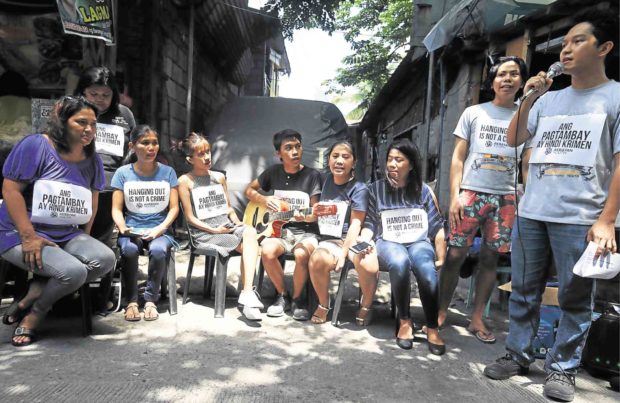
‘DOING NOTHING’ NOW A CRIME?Akbayan Youth members “bum around” by singing and having an idle chat as part of a protest action on Wednesday at Kalayaan Market, Barangay Central, Quezon City. —EDWIN BACASMAS
A group of youth activists dared President Rodrigo Duterte on Wednesday to bring his “anti-tambay” campaign to Congress and posh villages to disprove criticism that the government’s crackdown targeted only the poor.
With the hashtag #TambayProtest, a lightning rally was held by Akbayan Youth on Kalayaan Avenue at Barangay Central, Quezon City, to demand a stop to the police roundup of nighttime loiterers.
‘Military rule’
“Doing nothing is not a crime. If Mr. Duterte wants to prove that he is not antipoor, he should bring his antitambay campaign to Congress or do it in wealthy subdivisions,” said Justine Balane, Akbayan Youth spokesperson.
“We are doing this in defiance [of] the police crackdown, where many young people have been rounded up and thrown in jail merely for loitering on the streets. We are not in a state of military rule,” he added.
Based on data from the Philippine National Police (PNP), some 5,500 persons have been arrested for loitering in Metro Manila from June 13 to 18, according to Chief Supt. Guillermo Eleazar, National Capital Region Police Office director.
The PNP launched the campaign after the President ordered them to go after loiterers, whom he called “potential trouble for the public.”
Akbayan Youth expressed alarm over complaints that many of those arrested were rounded up while going about their daily activities.
“What crime is committed by these young people who went out to buy food or cell phone load at night? Or those who were in computer shops doing their school homework because they do not have their own laptop or computer at home?” Balane said.
Roots of problem
Instead of rounding up loiterers, he said, the President should focus on the roots of problems that have led to them becoming “tambay” (a street slang for bumming around and derived from “stand by”) such as joblessness and the rising cost of education.
Akbayan Youth slammed the PNP for being “blind followers” of the President by enforcing his order even after vagrancy had already been decriminalized.
Vagrancy was a considered a crime under Article 202 of the Revised Penal Code until the provision was repealed in 2012 under President Benigno Aquino III.
His mere say-so
Meanwhile, the human rights group Karapatan denounced the crackdown as another attempt to trample upon the people’s constitutional right to liberty, saying it was being carried out “without a set of clear guidelines, without cause and on the mere say-so of Duterte.”
The crackdown gave the police powers to arrest people even without valid ground and was “reminiscent of Marcos’ martial law,” under which nighttime curfews were enforced by “brutal State forces,” said Cristina Palabay, Karapatan secretary general.